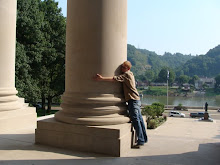
I'm beginning to realize what things I actually like about Washington D.C. and what things I could live without. It's been about three or maybe four weeks since I moved to the District, and I immediately began comparing it to all the other places that I've had the opportunity to live(Philippi, Syracuse,Savannah,Morgantown,LaCoste ..to name a few.)These are a few of the thoughts I have. On it's Pro's and Con's:
- Pro: "Local news is National news." It's a place that does a good job at asserting itself as the center of the American Cosmos. As the seat of the Federal Government the stuff that goes on and plays out on the stages of Congress, the white house, Federal departments and bureaus, even in the intelligence community all are happening just down the street. You ride to work daily with the people who run such organizations. While geographically you may not be in the heart of the country, you are in nations brain.
- Con: "The District has some issues-SERIOUS ones." a.While one would think that the nation's capital would be a place of great influence (which it is) and of highest priority among congressional decisions, the city has some major issues. It has the highest rate of HIV/AIDS of any U.S. city in a report from the New York Times from 2007, link below,(nytimes.com/2007/11/27/us/27aids.html) it states that about 1 in 50 are HIV positive. This can only be compared to countries that most in the US would label "foreign" or even of the "third world". No, this is not Africa, this is the capital of America, and it is not characteristic of the country as a whole. b. While this is the land of the free and home of the brave in the District of Columbia it is the city of the homeless. D.C.'s homeless population is estimated to be somewhere around 6%percent of the population.
- Con: "Taxation without Representation." This maybe the most ironic one on the list, but the capital of the United States(colonies that justified revolution because they were not receiving proper representation in the British ruling Parliament, and unfair taxes) Does NOT give the over 600,000 people living there representation in Congress even though they still pay income taxes. The city is ruled by a city council. As opposed to the past system of having a congressional committee create and manage the municipal budget.
- Pro: "It's a place active in activism." Multiple government buildings and public spaces in the District have served as the setting for some of the most nation changing decisions. The march on Washington is the most obvious example of this, and almost every controversial supreme court decision is illustrated by strong public outcry in front of the Supreme Court Building. Everyone in DC seems to have a very strong understanding of the politics of the nation, as well as multiple people employed by congress and the other branches of government.
- Pro: "The regular perks." Like most larger cities in the U.S. there is a strong emphasis on the humanities, arts and entertainment. The Smithsonian Institution is also a very driving cultural force in multiple forms of museums and Arts. Which are completely free for the most part..
- Pro: "Public transportation in a rather sprawling area." D.C. does a great job of connecting the outerlying areas and suburbs to the city by mass transportation. I wish sooo many other places could grasp this concept and execute it as well as DC does.
I'm sure I'm forgetting a few things, so I may have to amend this list later..



No comments:
Post a Comment